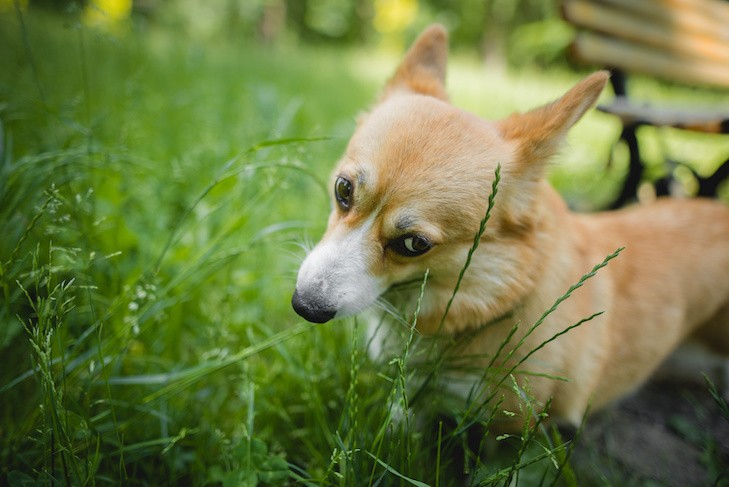Discovering your dog indulging in a less-than-appetizing snack of their own feces can be incredibly off-putting for any dog owner. It’s a behavior, scientifically termed coprophagia, that often leaves us puzzled and, frankly, disgusted. Rest assured, your dog isn’t trying to shock you with their dietary choices. While the act of eating poop is certainly repulsive to us, understanding the reasons behind it can help you address this common canine behavior effectively. If you’re wondering, Why Does My Dog Eat His Own Poop?, you’re not alone, and there are solutions.
Understanding Coprophagia in Dogs
Coprophagia, pronounced kop-ruh-fey-jee-uh, is the technical term for the consumption of feces. While it might seem bizarre to us, it’s a relatively common behavior in the canine world. Although the scientific community hasn’t fully unraveled all the intricacies of coprophagia in dogs, research suggests both behavioral and physiological factors play a role.
A study presented at the American Veterinary Society of Animal Behavior annual conference, led by Dr. Benjamin Hart at the University of California, Davis, shed light on the prevalence of this behavior. Their findings revealed that:
- A significant 16% of dogs were classified as “serious” poop eaters, meaning they were observed eating poop at least five times.
- An even larger 24% of dogs were observed engaging in poop-eating behavior at least once during the study.
Dr. Hart’s research suggests an evolutionary basis for this behavior. He theorized, “Our conclusion is that eating of fresh stools is a reflection of an innate predisposition of ancestral canids living in nature that protects pack members from intestinal parasites present in feces that could occasionally be dropped in the den/rest area.” In simpler terms, eating poop might be an instinctive behavior inherited from their wild ancestors, a way to keep their living spaces clean and reduce the risk of parasite transmission within their pack.
Furthermore, dogs evolved as scavengers, accustomed to consuming whatever they could find. Their sense of what’s palatable differs greatly from ours. Animal behaviorist Steven R. Lindsay, in his “Handbook of Applied Dog Behavior and Training,” proposes that coprophagia “may be one of several appetitive survival behaviors that have evolved to cope with the periodic adversity of starvation.” When food was scarce for their ancestors, being less discerning about food sources, including feces, could have been a survival advantage.
Is Poop Eating Normal Dog Behavior?
In some species, like rabbits, eating poop (specifically, a type of night feces called cecotropes) is essential for obtaining vital nutrients. However, dogs do not require poop consumption for nutritional needs. Nevertheless, coprophagia is considered a normal and natural behavior during certain stages of a dog’s life.
Mother dogs instinctively lick their puppies to stimulate elimination and diligently clean up their puppies’ waste by eating it for approximately the first three weeks after birth. This maternal behavior is crucial for hygiene in the den and potentially for nutrient recovery.
Puppies themselves also commonly engage in poop-eating behavior. This can include eating their own poop (autocoprophagia), poop from other dogs (allocoprophagia), as well as feces from cats and other animals. Some dogs even develop a particular fondness for horse manure or goose droppings.
While it’s generally not dangerous for puppies to eat their own poop, consuming feces from other animals can pose health risks. If the stool is contaminated with parasites, viruses, or toxins, it can lead to illness in the puppy. Fortunately, in most cases, this puppyhood poop-eating phase subsides naturally as they mature, typically before they reach nine months old.
Reasons Why Adult Dogs Eat Poop
If your adult dog suddenly starts eating poop, it’s important to consult with your veterinarian to rule out any underlying health issues. Several medical conditions can trigger or exacerbate coprophagia. These include:
- Parasites: Intestinal parasites can disrupt nutrient absorption and increase appetite, potentially leading to poop eating.
- Medications: Certain drugs, such as steroids, can also increase appetite as a side effect.
- Malabsorption syndromes: Conditions that impair nutrient absorption can cause dogs to seek out additional sources of nutrients, including feces.
- Diabetes, Cushing’s Disease, and Thyroid disease: These endocrine disorders can affect metabolism and appetite, sometimes leading to unusual eating behaviors like coprophagia.
- Nutrient or Calorie Deficiencies: Diets lacking essential nutrients or sufficient calories can drive dogs to seek out alternative food sources, which might include feces.
In other instances, coprophagia in adult dogs can be linked to environmental stress or behavioral triggers.
Environmental Stress and Behavioral Triggers
Certain environmental factors and behavioral situations can contribute to a dog developing or continuing a poop-eating habit:
- Isolation: Dogs kept in isolation, such as being confined to kennels or basements for extended periods, are more prone to coprophagia compared to dogs living closely with their families. Lack of social interaction and environmental enrichment can lead to stress and abnormal behaviors.
- Confinement to Small Spaces: Spending excessive time confined in restricted spaces can also trigger coprophagia. This is often observed in dogs rescued from overcrowded animal shelters where stress levels are high and space is limited.
- Anxiety and Punishment: Harsh punishment or negative reinforcement during house training can inadvertently lead to poop eating. Dogs may eliminate and then consume their feces in an attempt to eliminate the “evidence” and avoid further punishment, creating a negative cycle.
- Attention-Seeking: Even negative attention is still attention to a dog. If a dog learns that eating poop elicits a strong reaction from their owner, they might repeat the behavior to gain attention, even if it’s scolding.
- Inappropriate Association With Real Food: Feeding dogs in close proximity to their elimination areas can create an undesirable association between the smell of food and feces. This can blur the lines for some dogs, making feces seem like a potential food source. Feeding and potty areas should always be separate.
- Smelling Poop on Their Mothers: Puppies may become confused by detecting fecal odors on their mother’s breath after she cleans them. Additionally, mothers might occasionally regurgitate food mixed with puppy feces. This “appetitive inoculation,” as described by Lindsay, could potentially predispose puppies to develop coprophagia later in life.
- Living With a Sick or Elderly Dog: Healthy dogs sometimes consume feces from weaker or incontinent dogs within the household. Scientists speculate this could be an instinctual behavior to protect the pack from predators by removing the scent of vulnerable members’ waste.
How to Stop Your Dog From Eating Poop
Addressing coprophagia effectively requires understanding the underlying cause. Veterinarians and dog behaviorists often recommend a multi-faceted approach. If you’re concerned about your dog’s poop-eating habit, consulting your veterinarian is the first crucial step. They can rule out any medical conditions and guide you toward appropriate solutions, potentially including a referral to a behavioral expert if needed.
Several strategies have shown promise in reducing or eliminating coprophagia:
Vitamin and Enzyme Supplements
One long-standing theory suggests that dogs eat poop to compensate for dietary deficiencies, particularly vitamin deficiencies. Dog multivitamins are often recommended, with a specific focus on Vitamin B. Research in 1981 demonstrated that fecal microbial activity synthesizes thiamine, a B-vitamin, lending support to this theory. Other studies have pointed to deficiencies in other nutrients as potential contributing factors.
Another approach involves supplementing with digestive enzymes for dogs. Modern canine diets, often higher in carbohydrates and lower in meat-based proteins and fats compared to ancestral diets, might lead to digestive enzyme deficiencies. Enzyme supplements, especially those containing papain, an enzyme that aids digestion, have been successful for some dogs.
Taste-Aversion Products
Capitalizing on the idea that certain tastes and smells are as unappealing to dogs as poop is to us, poop-eating deterrents are available. These come in the form of treats or powders added to food. The goal is to make the dog’s feces taste unpleasant, thus deterring consumption. Common ingredients in these products include monosodium glutamate, chamomile, pepper-plant derivatives, yucca, garlic, and parsley. It’s crucial to treat all dogs (and cats) in the household with these deterrents to ensure all feces are unpalatable to the poop-eating dog. Bitter-tasting sprays can also be applied directly to feces to make them less appealing.
Environmental Management and Training Techniques
Often, the most effective long-term solution for coprophagia involves a combination of environmental management and consistent training. This includes:
- Maintaining a Clean Environment: Keep your dog’s living area, including the yard, meticulously clean and free of feces. This removes the temptation and opportunity for poop eating.
- Supervised Walks and Immediate Poop Removal: Closely supervise your dog during walks and immediately pick up their poop. Carry poop bags and dispose of waste promptly.
- “Leave It” and “Come” Training: Mastering the “leave it” and “come” commands is invaluable. “Leave it” can be used to prevent your dog from approaching feces, while “come” can redirect their attention away from poop.
- Reward-Based Interruption: Teach your dog to come to you for a tasty treat immediately after they poop. This creates a positive association and encourages them to focus on you for a reward instead of their feces.
- Cat Litter Box Management: If you have cats, ensure the litter box is inaccessible to your dog. This can involve using self-cleaning litter boxes, placing the litter box in a dog-proof room, or using a dog gate to restrict access. Regular cleaning of the litter box is also essential.
Interesting Facts About Canine Coprophagia
Coprophagia in puppies is often considered a normal part of their exploratory phase as they investigate the world around them. While most puppies are content with sniffing and examining poop, some are inclined to explore everything with their mouths, including feces.
Interestingly, dogs who eat poop tend to prefer hard, formed stools and often avoid soft feces or diarrhea. Frozen poop seems to be particularly enticing to some dogs.
Dr. Hart’s study also revealed some other intriguing observations about coprophagia:
- Coprophagia is more prevalent in multi-dog households compared to single-dog homes.
- Dogs who eat poop are not inherently harder to house train than dogs that don’t.
- Female dogs are more likely to engage in coprophagia, while intact males are the least likely.
- A significant majority (92%) of poop eaters prefer fresh poop, only one to two days old.
- Most dog poop eaters (85%) primarily consume feces from other dogs and avoid eating their own.
- Dogs who are “greedy eaters,” known for stealing food, are more likely to be poop eaters.
If you observe your dog eating poop, it’s essential to consult with your veterinarian to determine the underlying cause. Understanding the “why” behind this behavior is key to finding the most effective solution and helping your dog break this habit. Addressing coprophagia is possible, and with the right approach, you can help your dog overcome this unpleasant behavior.

